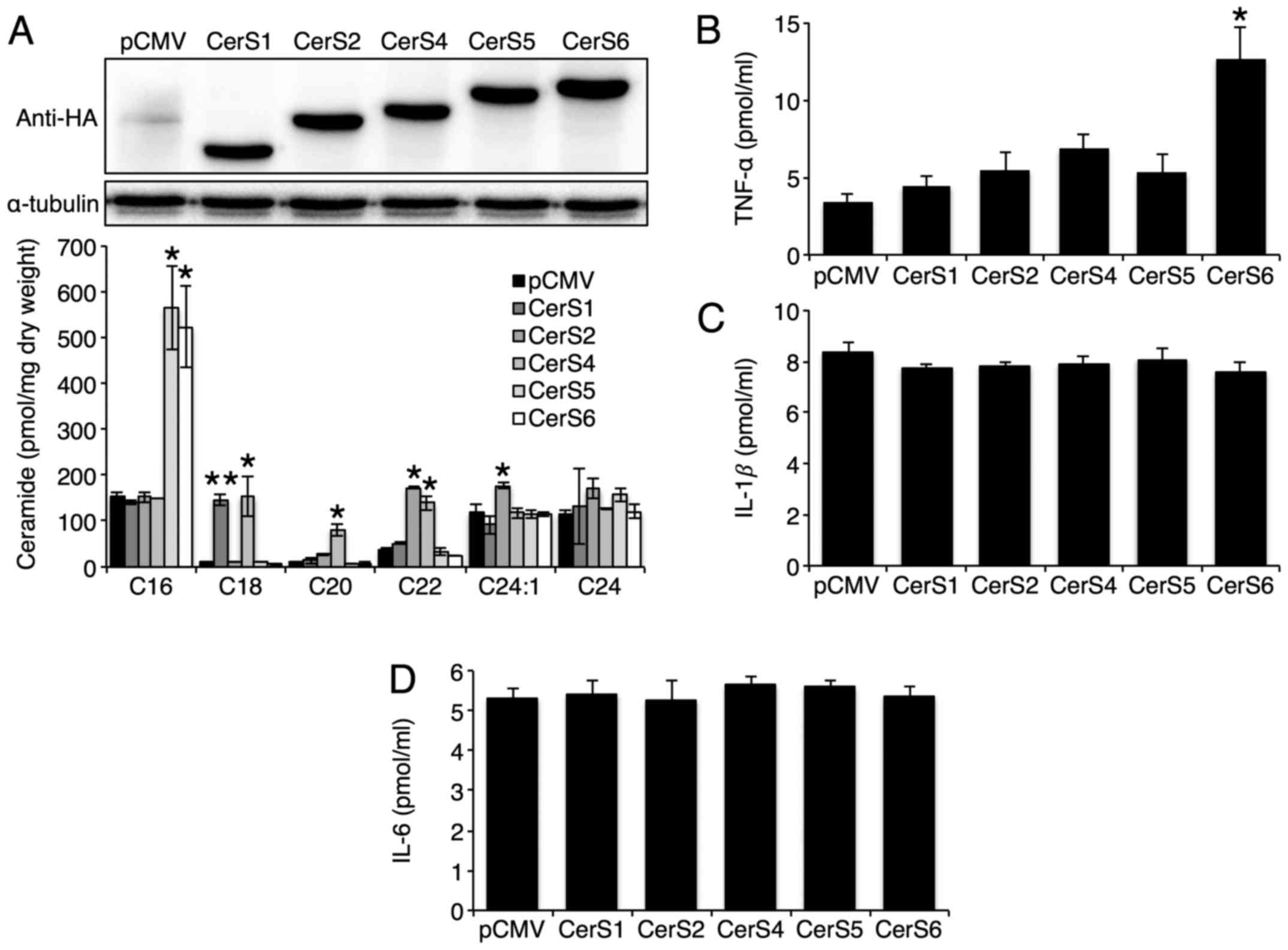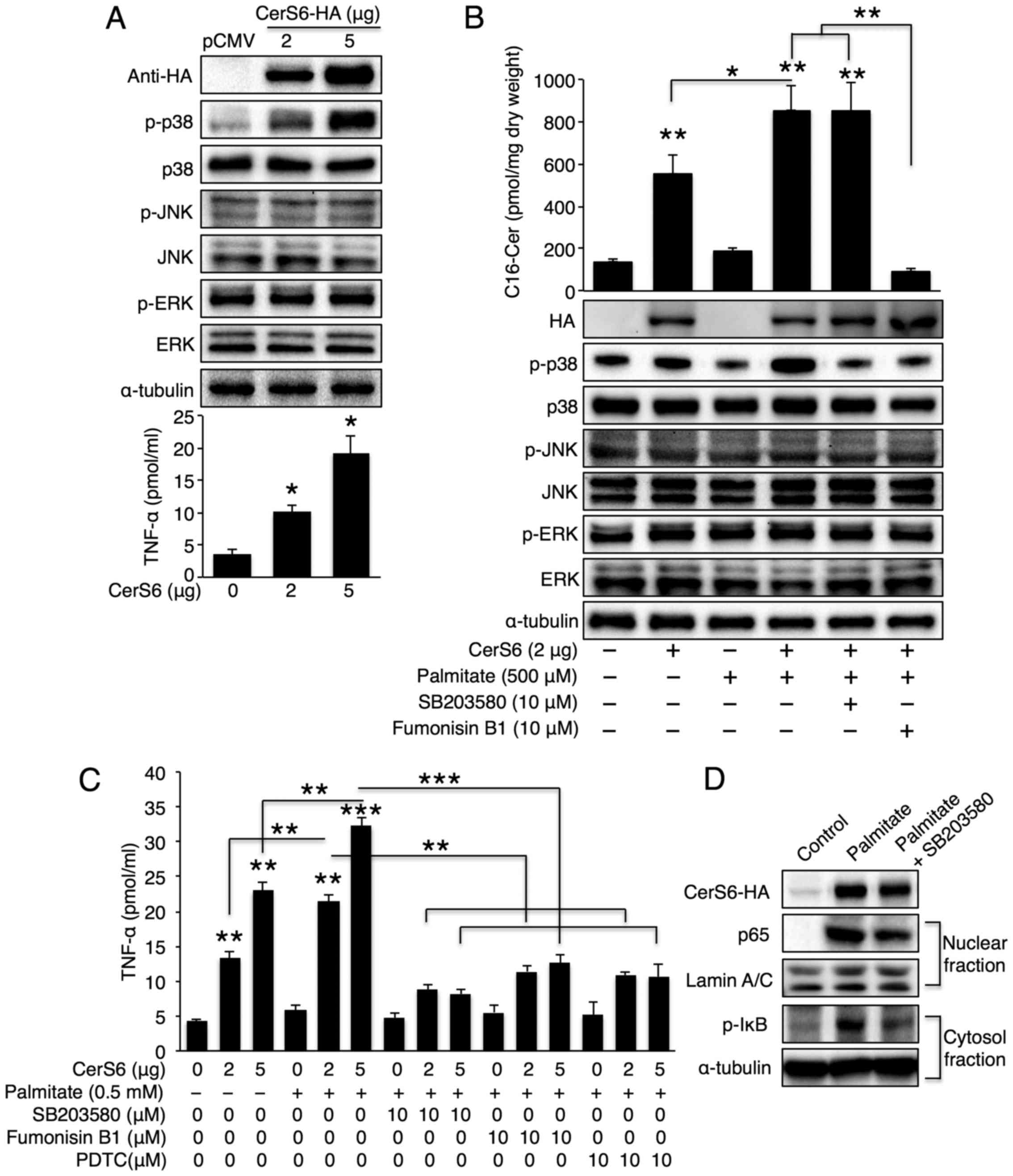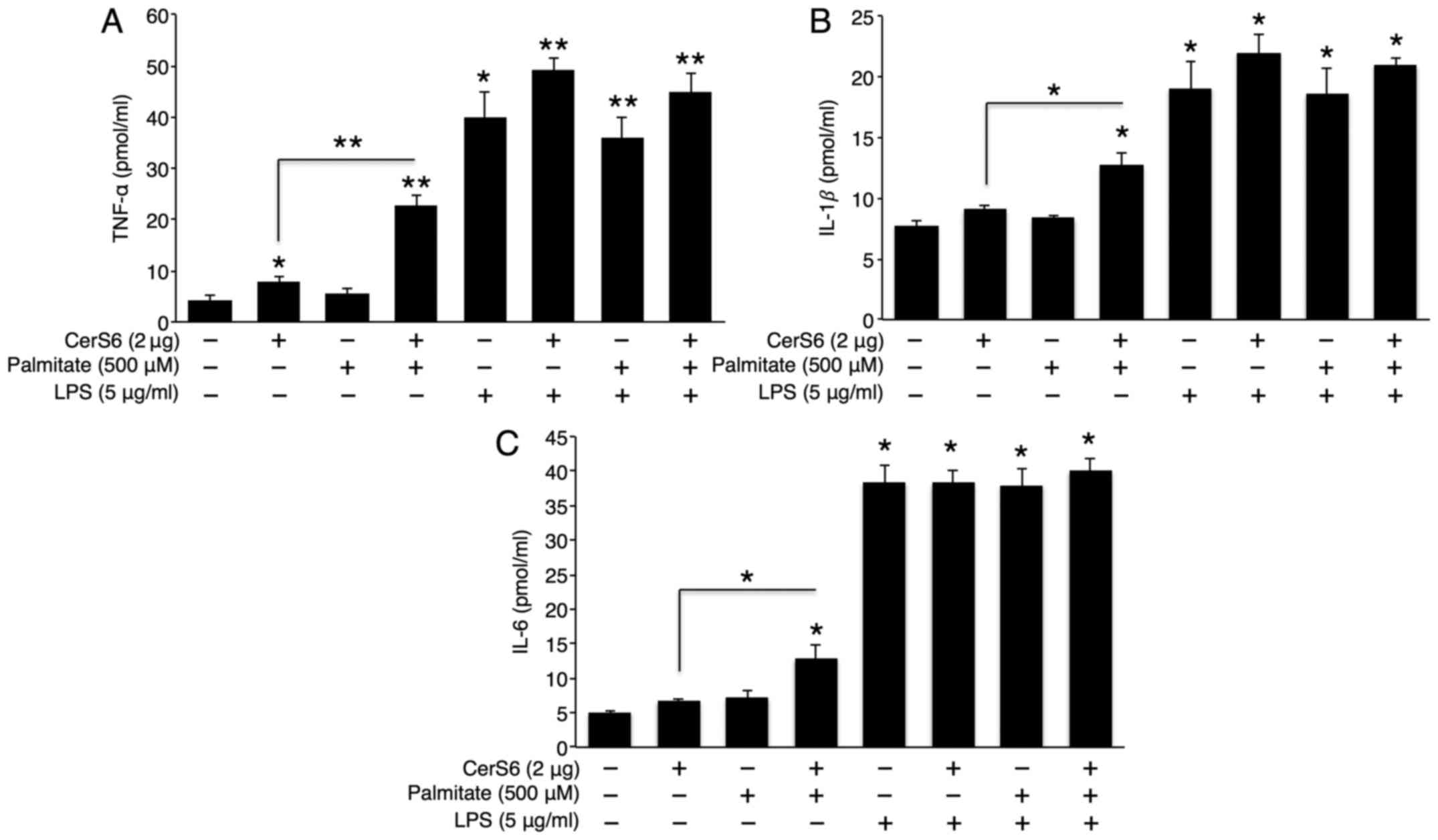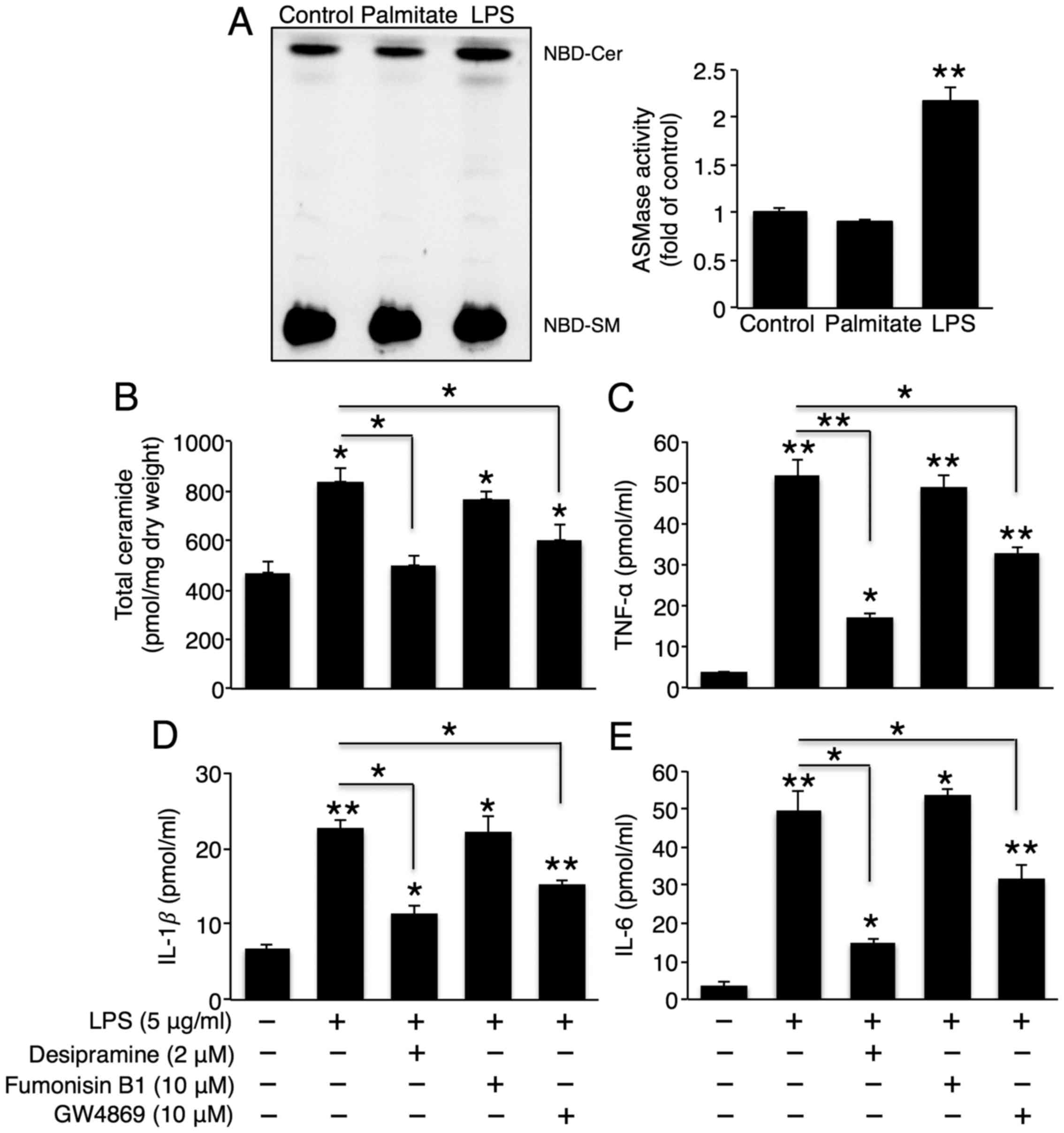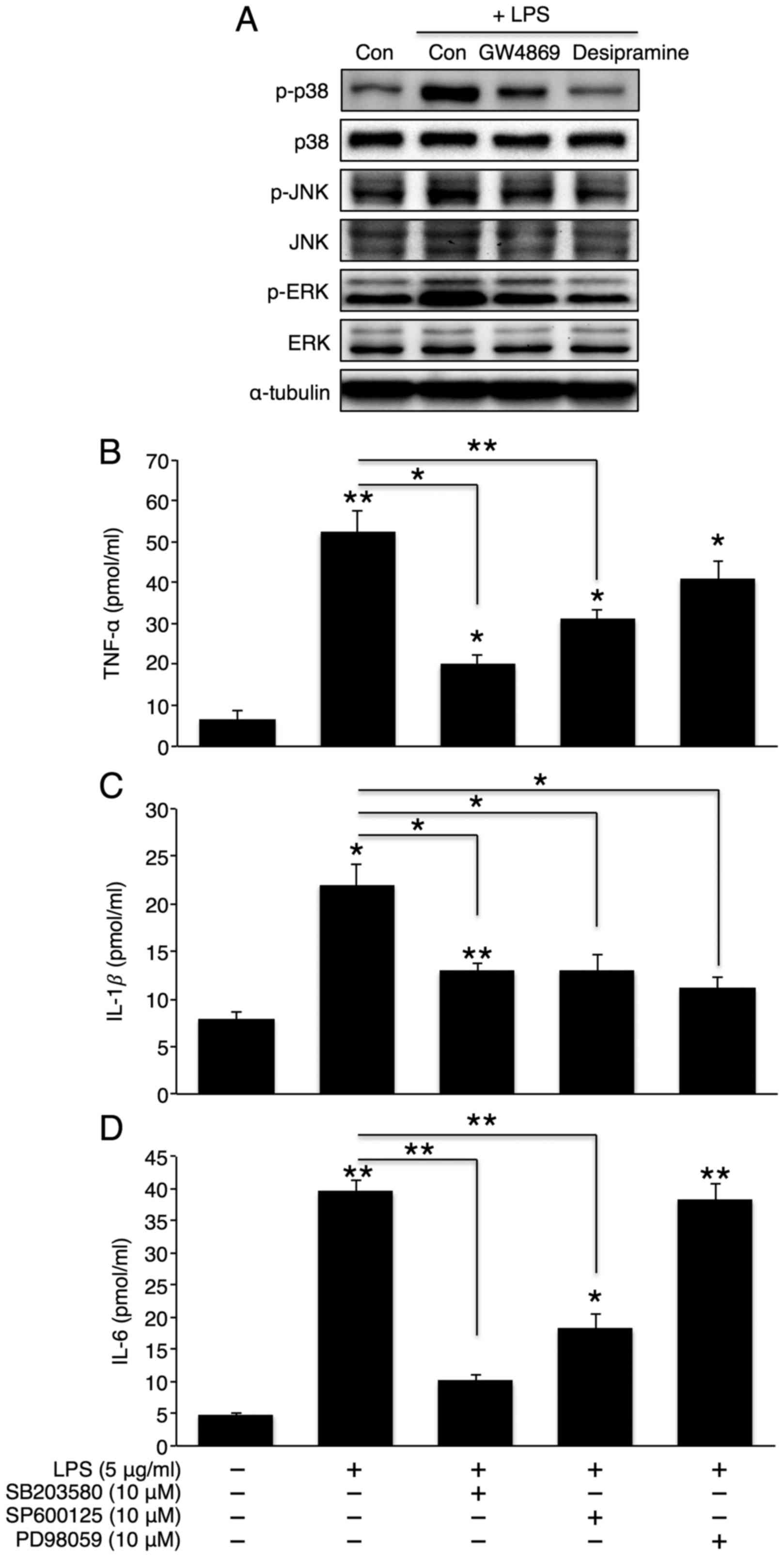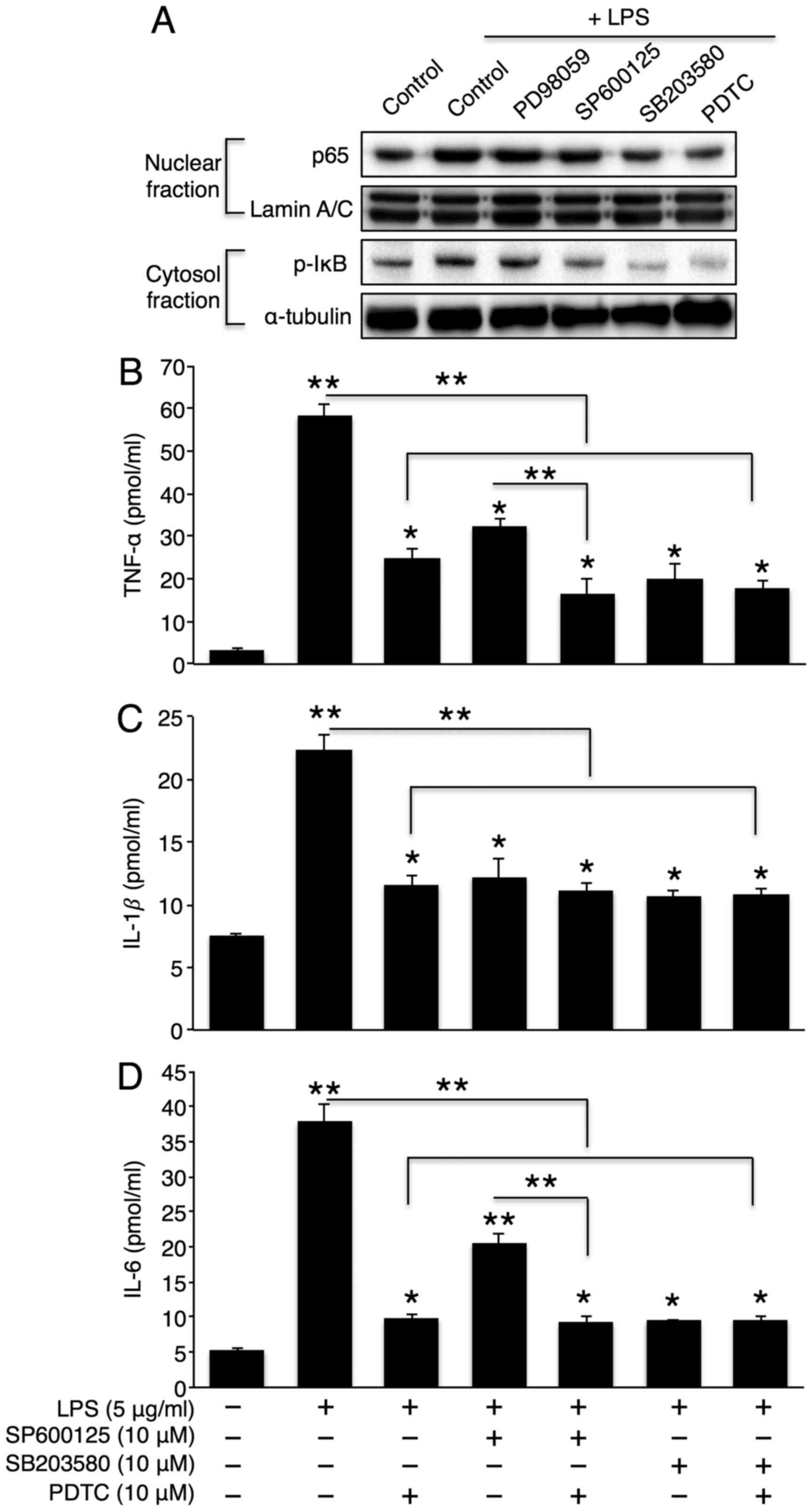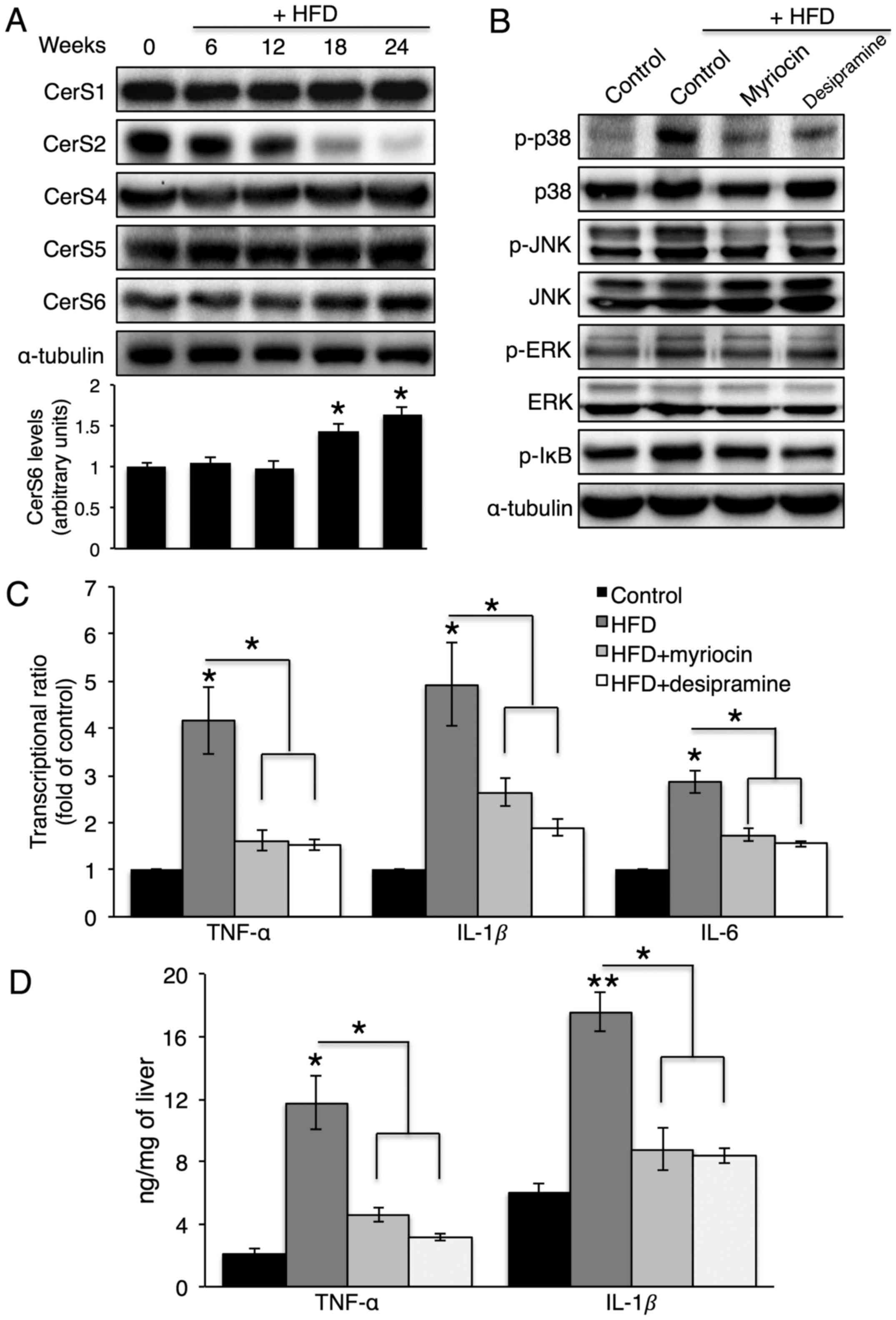|
1
|
Esser N, Legrand-Poels S, Piette J, Scheen
AJ and Paquot N: Inflammation as a link between obesity, metabolic
syndrome and type 2 diabetes. Diabetes Res Clin Pract. 105:141–150.
2014. View Article : Google Scholar : PubMed/NCBI
|
|
2
|
Monteiro R and Azevedo I: Chronic
inflammation in obesity and the metabolic syndrome. Mediators
Inflamm. 2010:2896452010. View Article : Google Scholar : PubMed/NCBI
|
|
3
|
Boden G: Obesity, insulin resistance and
free fatty acids. Curr Opin Endocrinol Diabetes Obes. 18:139–143.
2011. View Article : Google Scholar : PubMed/NCBI
|
|
4
|
Ståhlman M, Pham HT, Adiels M, Mitchell
TW, Blanksby SJ, Fagerberg B, Ekroos K and Borén J: Clinical
dyslipidaemia is associated with changes in the lipid composition
and inflammatory properties of apolipoprotein-B-containing
lipoproteins from women with type 2 diabetes. Diabetologia.
55:1156–1166. 2012. View Article : Google Scholar : PubMed/NCBI
|
|
5
|
Pillon NJ, Azizi PM, Li YE, Liu J, Wang C,
Chan KL, Hopperton KE, Bazinet RP, Heit B, Bilan PJ, et al:
Palmitate-induced inflammatory pathways in human adipose
microvascular endothelial cells promote monocyte adhesion and
impair insulin transcytosis. Am J Physiol Endocrinol Metab.
309:E35–E44. 2015. View Article : Google Scholar : PubMed/NCBI
|
|
6
|
Haus JM, Kashyap SR, Kasumov T, Zhang R,
Kelly KR, Defronzo RA and Kirwan JP: Plasma ceramides are elevated
in obese subjects with type 2 diabetes and correlate with the
severity of insulin resistance. Diabetes. 58:337–343. 2009.
View Article : Google Scholar :
|
|
7
|
Brozinick JT, Hawkins E, Hoang Bui H, Kuo
MS, Tan B, Kievit P and Grove K: Plasma sphingolipids are
biomarkers of metabolic syndrome in non-human primates maintained
on a Western-style diet. Int J Obes. 37:1064–1070. 2013. View Article : Google Scholar
|
|
8
|
Park WJ and Park JW: The effect of altered
sphingolipid acyl chain length on various disease models. Biol
Chem. 396:693–705. 2015. View Article : Google Scholar : PubMed/NCBI
|
|
9
|
Park JW, Park WJ and Futerman AH: Ceramide
synthases as potential targets for therapeutic intervention in
human diseases. Biochim Biophys Acta. 1841:671–681. 2014.
View Article : Google Scholar
|
|
10
|
Venkataraman K, Riebeling C, Bodennec J,
Riezman H, Allegood JC, Sullards MC, Merrill AH Jr and Futerman AH:
Upstream of growth and differentiation factor 1 (uog1), a mammalian
homolog of the yeast longevity assurance gene 1 (LAG1), regulates
N-stearoyl-sphinganine (C18-(dihydro) ceramide) synthesis in a
fumonisin B1-independent manner in mammalian cells. J Biol Chem.
277:35642–35649. 2002. View Article : Google Scholar : PubMed/NCBI
|
|
11
|
Lahiri S and Futerman AH: LASS5 is a bona
fide dihydroceramide synthase that selectively utilizes
palmitoyl-CoA as acyl donor. J Biol Chem. 280:33735–33738. 2005.
View Article : Google Scholar : PubMed/NCBI
|
|
12
|
Mizutani Y, Kihara A and Igarashi Y:
Mammalian Lass6 and its related family members regulate synthesis
of specific ceramides. Biochem J. 390:263–271. 2005. View Article : Google Scholar : PubMed/NCBI
|
|
13
|
Riebeling C, Allegood JC, Wang E, Merrill
AH Jr and Futerman AH: Two mammalian longevity assurance gene
(LAG1) family members, trh1 and trh4, regulate dihydroceramide
synthesis using different fatty acyl-CoA donors. J Biol Chem.
278:43452–43459. 2003. View Article : Google Scholar : PubMed/NCBI
|
|
14
|
Laviad EL, Albee L, Pankova-Kholmyansky I,
Epstein S, Park H, Merrill AH Jr and Futerman AH: Characterization
of ceramide synthase 2: Tissue distribution, substrate specificity,
and inhibition by sphingosine 1-phosphate. J Biol Chem.
283:5677–5684. 2008. View Article : Google Scholar : PubMed/NCBI
|
|
15
|
Mizutani Y, Kihara A and Igarashi Y: LASS3
(longevity assurance homologue 3) is a mainly testis-specific
(dihydro) ceramide synthase with relatively broad substrate
specificity. Biochem J. 398:531–538. 2006. View Article : Google Scholar : PubMed/NCBI
|
|
16
|
Mesicek J, Lee H, Feldman T, Jiang X,
Skobeleva A, Berdyshev EV, Haimovitz-Friedman A, Fuks Z and
Kolesnick R: Ceramide synthases 2, 5, and 6 confer distinct roles
in radiation-induced apoptosis in HeLa cells. Cell Signal.
22:1300–1307. 2010. View Article : Google Scholar : PubMed/NCBI
|
|
17
|
Goñi FM and Alonso A: Sphingomyelinases:
Enzymology and membrane activity. FEBS Lett. 531:38–46. 2002.
View Article : Google Scholar : PubMed/NCBI
|
|
18
|
Tolman KG, Fonseca V, Dalpiaz A and Tan
MH: Spectrum of liver disease in type 2 diabetes and management of
patients with diabetes and liver disease. Diabetes Care.
30:734–743. 2007. View Article : Google Scholar : PubMed/NCBI
|
|
19
|
Roux JC, Dura E, Moncla A, Mancini J and
Villard L: Treatment with desipramine improves breathing and
survival in a mouse model for Rett syndrome. Eur J Neurosci.
25:1915–1922. 2007. View Article : Google Scholar : PubMed/NCBI
|
|
20
|
Glaros EN, Kim WS, Wu BJ, Suarna C, Quinn
CM, Rye KA, Stocker R, Jessup W and Garner B: Inhibition of
atherosclerosis by the serine palmitoyl transferase inhibitor
myriocin is associated with reduced plasma glycosphingolipid
concentration. Biochem Pharmacol. 73:1340–1346. 2007. View Article : Google Scholar : PubMed/NCBI
|
|
21
|
Ali M, Fritsch J, Zigdon H, Pewzner-Jung
Y, Schütze S and Futerman AH: Altering the sphingolipid acyl chain
composition prevents LPS-GLN-mediated hepatic failure in mice by
disrupting TNFR1 internalization. Cell Death Dis. 4:e9292013.
View Article : Google Scholar
|
|
22
|
Halasiddappa LM, Koefeler H, Futerman AH
and Hermetter A: Oxidized phospholipids induce ceramide
accumulation in RAW 264.7 macrophages: Role of ceramide synthases.
PLoS One. 8:e700022013. View Article : Google Scholar : PubMed/NCBI
|
|
23
|
Jeong YM, Park WJ, Kim MK, Baek KJ, Kwon
NS, Yun HY and Kim DS: Leucine-rich glioma inactivated 3 promotes
HaCaT keratinocyte migration. Wound Repair Regen. 21:634–640. 2013.
View Article : Google Scholar : PubMed/NCBI
|
|
24
|
Livak KJ and Schmittgen TD: Analysis of
relative gene expression data using real-time quantitative PCR and
the 2(-Delta Delta C(T)) Method. Methods. 25:402–408. 2001.
View Article : Google Scholar
|
|
25
|
Choi S, Kim JA, Kim TH, Li HY, Shin KO,
Lee YM, Oh S, Pewzner-Jung Y, Futerman AH and Suh SH: Altering
sphingolipid composition with aging induces contractile dysfunction
of gastric smooth muscle via K(Ca) 1.1 upregulation. Aging Cell.
14:982–994. 2015. View Article : Google Scholar : PubMed/NCBI
|
|
26
|
Shaner RL, Allegood JC, Park H, Wang E,
Kelly S, Haynes CA, Sullards MC and Merrill AH Jr: Quantitative
analysis of sphingolipids for lipidomics using triple quadrupole
and quadrupole linear ion trap mass spectrometers. J Lipid Res.
50:1692–1707. 2009. View Article : Google Scholar :
|
|
27
|
Campbell J, Ciesielski CJ, Hunt AE,
Horwood NJ, Beech JT, Hayes LA, Denys A, Feldmann M, Brennan FM and
Foxwell BM: A novel mechanism for TNF-alpha regulation by p38 MAPK:
Involvement of NF-kappa B with implications for therapy in
rheumatoid arthritis. J Immunol. 173:6928–6937. 2004. View Article : Google Scholar : PubMed/NCBI
|
|
28
|
Józefowski S, Czerkies M, Łukasik A,
Bielawska A, Bielawski J, Kwiatkowska K and Sobota A: Ceramide and
ceramide 1-phosphate are negative regulators of TNF-α production
induced by lipopolysaccharide. J Immunol. 185:6960–6973. 2010.
View Article : Google Scholar
|
|
29
|
El Alwani M, Wu BX, Obeid LM and Hannun
YA: Bioactive sphingolipids in the modulation of the inflammatory
response. Pharmacol Ther. 112:171–183. 2006. View Article : Google Scholar : PubMed/NCBI
|
|
30
|
Soriano JM, González L and Catalá AI:
Mechanism of action of sphingolipids and their metabolites in the
toxicity of fumonisin B1. Prog Lipid Res. 44:345–356. 2005.
View Article : Google Scholar : PubMed/NCBI
|
|
31
|
Dandona P, Aljada A and Bandyopadhyay A:
Inflammation: The link between insulin resistance, obesity and
diabetes. Trends Immunol. 25:4–7. 2004. View Article : Google Scholar
|
|
32
|
Bikman BT and Summers SA: Ceramides as
modulators of cellular and whole-body metabolism. J Clin Invest.
121:4222–4230. 2011. View Article : Google Scholar : PubMed/NCBI
|
|
33
|
Holland WL, Brozinick JT, Wang L-P,
Hawkins ED, Sargent KM, Liu Y, Narra K, Hoehn KL, Knotts TA, Siesky
A, et al: Inhibition of ceramide synthesis ameliorates
glucocorticoid-, saturated-fat-, and obesity-induced insulin
resistance. Cell Metab. 5:167–179. 2007. View Article : Google Scholar : PubMed/NCBI
|
|
34
|
Blais DR, Vascotto SG, Griffith M and
Altosaar I: LBP and CD14 secreted in tears by the lacrimal glands
modulate the LPS response of corneal epithelial cells. Invest
Ophthalmol Vis Sci. 46:4235–4244. 2005. View Article : Google Scholar : PubMed/NCBI
|
|
35
|
Chen CL, Lin CF, Chang WT, Huang WC, Teng
CF and Lin YS: Ceramide induces p38 MAPK and JNK activation through
a mechanism involving a thioredoxin-interacting protein-mediated
pathway. Blood. 111:4365–4374. 2008. View Article : Google Scholar : PubMed/NCBI
|
|
36
|
Park WJ, Park JW, Merrill AH Jr, Storch J,
Pewzner-Jung Y and Futerman AH: Hepatic fatty acid uptake is
regulated by the sphingolipid acyl chain length. Biochim Biophys
Acta. 1841:1754–1766. 2014. View Article : Google Scholar : PubMed/NCBI
|
|
37
|
Russo SB, Baicu CF, Van Laer A, Geng T,
Kasiganesan H, Zile MR and Cowart LA: Ceramide synthase 5 mediates
lipid-induced autophagy and hypertrophy in cardiomyocytes. J Clin
Invest. 122:3919–3930. 2012. View Article : Google Scholar : PubMed/NCBI
|
|
38
|
Schiffmann S, Ferreirós N, Birod K, Eberle
M, Schreiber Y, Pfeilschifter W, Ziemann U, Pierre S, Scholich K,
Grösch S and Geisslinger G: Ceramide synthase 6 plays a critical
role in the development of experimental autoimmune
encephalomyelitis. J Immunol. 188:5723–5733. 2012. View Article : Google Scholar : PubMed/NCBI
|
|
39
|
Jin J, Zhang X, Lu Z, Perry DM, Li Y,
Russo SB, Cowart LA, Hannun YA and Huang Y: Acid sphingomyelinase
plays a key role in palmitic acid-amplified inflammatory signaling
triggered by lipopolysaccharide at low concentrations in
macrophages. Am J Physiol Endocrinol Metab. 305:E853–E867. 2013.
View Article : Google Scholar : PubMed/NCBI
|
|
40
|
Schilling JD, Machkovech HM, He L, Sidhu
R, Fujiwara H, Weber K, Ory DS and Schaffer JE: Palmitate and
lipopolysaccharide trigger synergistic ceramide production in
primary macrophages. J Biol Chem. 288:2923–2932. 2013. View Article : Google Scholar :
|
|
41
|
Cuschieri J, Bulger E, Billgrin J, Garcia
I and Maier RV: Acid sphingomyelinase is required for lipid Raft
TLR4 complex formation. Surg Infect (Larchmt). 8:91–106. 2007.
View Article : Google Scholar
|
|
42
|
Liu G, Friggeri A, Yang Y, Park YJ,
Tsuruta Y and Abraham E: miR-147, a microRNA that is induced upon
Toll-like receptor stimulation, regulates murine macrophage
inflammatory responses. Proc Natl Acad Sci USA. 106:15819–15824.
2009. View Article : Google Scholar : PubMed/NCBI
|
|
43
|
Kawane K, Tanaka H, Kitahara Y, Shimaoka S
and Nagata S: Cytokine-dependent but acquired immunity-independent
arthritis caused by DNA escaped from degradation. Proc Natl Acad
Sci USA. 107:19432–19437. 2010. View Article : Google Scholar : PubMed/NCBI
|















